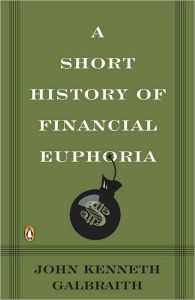Join getAbstract to access the summary!

Join getAbstract to access the summary!
John Kenneth Galbraith
A Short History of Financial Euphoria
Penguin, 1994
What's inside?
Galbraith’s financial essay warns that devastating fiscal collapse is inevitable in the free enterprise system.
Recommendation
John Kenneth Galbraith’s short, literary book on financial speculation and the inevitability of subsequent economic catastrophe contends that devastating financial collapse is built into the free-enterprise system – an idea as intriguing today as it was when this book debuted in the mid-1990s. The late famous economist ended this treatise with a chilling question: “When will come the next great speculative episode and in what venue will it recur?” Everyone now knows the answer to that question all too well. Alarmingly, according to Galbraith, the travails that capitalist economies are now grimly experiencing will recur over and over. getAbstract suggests that anyone who wants to understand the kinks in the system – and human nature – that will continue to lead to hugely devastating, economic train wrecks should read Galbraith’s book.
Summary
About the Author
World-famous economist John Kenneth Galbraith taught at Harvard and Princeton, and wrote more than 40 books. He served as U.S. Ambassador to India for President John F. Kennedy. Galbraith died in 2006.


















Comment on this summary